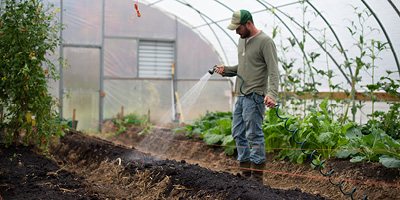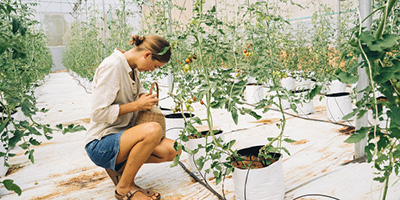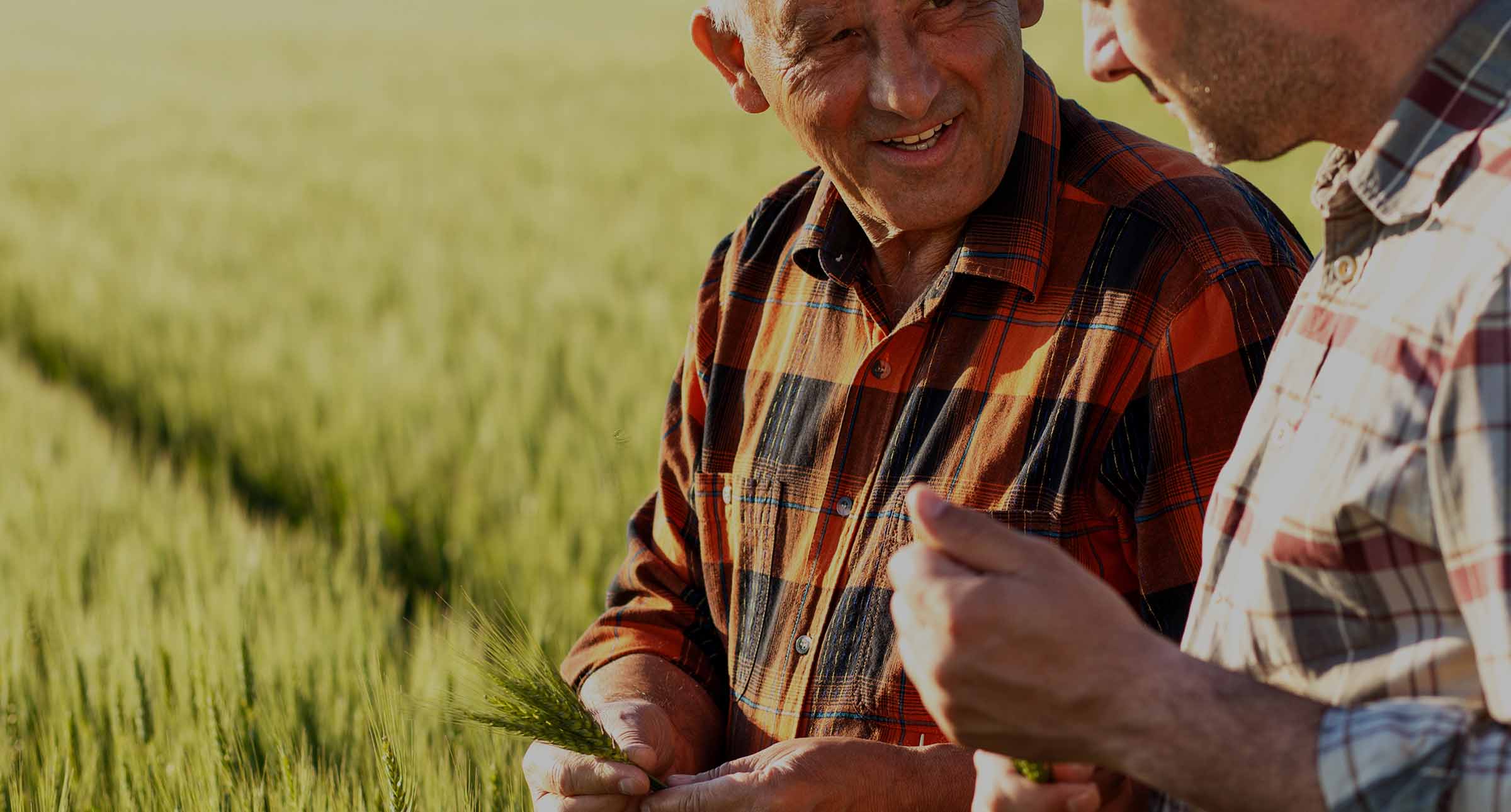Farmer Giles owns Fresh Fields Farm. He is a widower in his 80s and has two sons, Brian and Robert.
In recent years Giles’s health has started to deteriorate and he is suffering from early-stage dementia, which is making managing the farm and business increasingly challenging.
As such Brian, who lives in a cottage on the farm with his fiancé, Sarah, has become more actively involved in working on the farm, and helping to run the business. Robert on the other hand runs his own successful business and currently plays no role in the family farm.
On top of his ill health, the farm has struggled to recover following the pandemic and both Giles and his sons are looking for ways to save money, and are even considering selling off part of the farm as development land.
Giles is also thinking about succession planning and is considering inviting Brian to become a partner in the farm business, which will include becoming a joint owner of all properties located on the farm and its land.
What advice should be given to Giles to help protect the future of the farm, his business, and his sons?

Given Giles’ health issues and the assistance Brian has already given in running the farming business, it's very sensible for Giles to be thinking about a partnership with Brian. However, there are several things that Giles will need to consider in relation to tax (both in his lifetime and on his death) and the fair division of his estate when he passes away.

Making the decision to sell part of the farmland would be a huge decision for Giles and his family. Here we outline what what Giles should do in order to start the process and maximise returns.

Family farming cases are one of the most difficult matrimonial disputes to resolve when considering a financial settlement within a divorce. To help address any immediate concerns, Giles has some, relatively simple, protective, legal steps that can be taken in advance to assist in safeguarding the family farm, and to protect against any future claims.


Agricultural Property Relief (APR) - What you need to know
How APR can help Giles save money and protect the farm and its buildings.
By Jan Tyley - RWK Goodman, Private client, Associate
Given Giles’ health issues and the assistance Brian has already given in running the farming business, it’s very sensible for Giles to be thinking about a partnership with Brian. However, there are several things that Giles will need to consider in relation to tax (both in his lifetime and on his death) and the fair division of his estate when he passes away.
A key consideration are the steps he could take to ensure that he does not lose the benefit of Agricultural Property Relief (APR) with concern to the inheritance tax on his estate, and the likely value of the farm.
Am I eligible to claim Agricultural Property Relief?
To qualify for APR, there are a few requirements that need to be met:
- The property needs to be agricultural in nature.
- If he is currently farming the land, Giles must have owned the property for a minimum of 2 years before his death. If someone else is farming the land, Giles must have owned the land for a minimum of 7 years.
- The property needs to be occupied for agricultural purposes throughout the qualifying period.
- Any farmhouse, cottage, or building included in the farm must be of a character appropriate to the farmland.
On the face of it, Giles’s land currently qualifies for APR because he has owned and farmed it for longer than 2 years. However, his current health issues suggest that it may not be possible for him to continue to be a hands-on farmer up until his death. If he does nothing, this valuable relief may be lost, resulting in the farm having to be sold on his death in order to pay his inheritance tax bill.
What are the benefits of Partnership Farming? – Is bringing Brian on board the right decision?
Where land is farmed by a partnership, each partner is treated as being in occupation of the whole of the land farmed. By making Brian a partner in the farming business, Giles would be able to think about winding down his involvement in the day-to-day running of the farm, as he would be entitled to APR on his partnership share.
If Giles decides to do this, he will need to consider what share of the farming business to give to Brian, and whether he should retain the farm property personally, or transfer some or all of it to the partnership. Any transfer of land to the partnership would be a disposal of part of that land equivalent to the share of the partnership given to Brian which may in turn give rise to a capital gains tax liability. In concern of the transfer Giles should then consider whether he and Brian should make a hold-over election for capital gains tax as this could save on having to pay capital gains tax at this point.
It’s important that Giles formalises his agreement with Brian regarding the terms of the Partnership Agreement covering areas such as; profit share ratios, capital shares, and what will happen to the partnership when one of them dies. He should be careful not to include any terms in the agreement that could be construed as giving rise to a ”buy and sell” agreement on his death. Doing this this would constitute a binding contract for sale and would prevent APR relief applying to Giles’s share of the farmland and properties.
The farmhouse and APR
Should Giles start to reduce his day-to-day involvement in the running of the farm, he should consider where he and Brian live. Currently Giles lives in the main farmhouse and Brian and Sarah live in a cottage on the farm.
Whilst Giles is actively involved in the running of the farm, there should be no doubt that the farmhouse is occupied for agricultural purposes. So long as its character is appropriate for the farm (i.e. it is a proper working farmhouse and not a large “gentleman’s residence”), it will qualify for APR. However, if Giles is no longer actively involved in the farming business at his death, but has remained living in the farmhouse, APR on the agricultural value of the farmhouse will be lost.
As the farmhouse is often one of the more valuable parts of the farm, it is important for Giles and Brian to ensure that they keep things under review to ensure that the relief on the farmhouse is not lost. As Giles steps back from being as active on the farm, they may also wish to consider swapping houses, particularly if Brian and Sarah get married and start a family.
Interaction between APR and Business Property Relief (BPR)
Where both APR and BRP can be claimed in relation to a farm business and its assets, APR is applied first, then BPR may be claimed on the balance of the value of the farming business – provided that the partnership qualifies as a trading business for BPR purposes, and meets the minimum ownership period test of 2 years.
This is helpful as the farm machinery and the partnership bank accounts would be outside of the scope of APR relief, as would any land not used for agricultural purposes. Provided the farming business represents the majority of the business in the partnership, then BRP should be available in relation to all of the business and business assets.
Can I sell farmland to developers? How could this impact my BPR claim?
When considering whether to sell part of the farm for development, Giles should be mindful of the effect that this might have on the farm business’s ability to claim BPR. Unless Giles and his sons intend to fully develop the land before selling, the “development land” is likely to be viewed as an investment rather than qualify as a business property. If the area of land is too large, or Giles and his sons are increasing the value of the land – for example by securing planning permission ahead of marketing the land for sale. Giles’s estate may lose BPR on the farming business if Giles dies before the land can be sold, or any value adding activity tips the business from being a more than 50% trading business to a more than 50% investment business.
How do I split an estate between siblings?
Ensuring that there is fairness between Brian and Robert is unlikely to be as simple as dividing everything 50-50 between them. With Brian working on the farm and taking on the majority of the burden of running the farm in Giles’ later years, Brian may expect to receive a greater share. He could also expect to inherit the whole farm, particularly if Giles has previously suggested this, by way of compensating him for giving up his previous life to help his father. This is in contrast with his brother Robert, who had been afforded the freedom and time to establish his own successful business.
A disappointed beneficiary who can demonstrate that he has been given assurances by the deceased, and who has acted to his detriment in reliance of those assurances, can bring a claim for “proprietary estoppel”. This can be claimed if it is unconscionable for the Court to allow the deceased to renege on the assurances given whilst he was alive – as demonstrated in the recent case of Spencer v Spencer which was decided in the High Court this year.
For clarity, if the family dynamics allow, Giles should also consider discussing what he would like to happen to the farm with Brian and Robert on the event of his death. This may then enable the family to understand the reasons for his decisions and hopefully agree with them.


Selling part of a farm as development land - Where do I start?
What are the key actions Giles and his sons need to take if they are considering selling off part of the farm?
By Chris Willows - RWK Goodman, Residential Property, Farms & Estates Solicitor
When considering the sale of land Giles should first liaise with a land agent to value the land and discuss the potential for development. For the purposes of this article, we shall assume he finds a buyer and agrees to sell part of the agricultural land.
How do I register land with the Land Registry?
Regarding the legal process, the first task when dealing with the sale is to seek confirmation as to whether the agricultural land is registered with the Land Registry. If the land is not registered, and no copies of the legal title are available at the Registry, then the title to the property must be deduced. This would involve asking Giles to produce the property deeds and seeking a good root of title. This could be provided through a Conveyance or Mortgage Deed. Once the title has been deduced and it has been evidenced that Giles is the legal owner who has the right to sell the land, the conveyancing process can begin.
Land access and infrastructure
Giles should be advised if the agricultural land has sufficient access to roads, utilities, and the infrastructure necessary for its development. Development of the land will require clear access routes and utilities to proceed it. Any limitations in this regard could impact the land’s marketability and value.
As Giles is selling part of the land, his solicitor will draft a Transfer of Part (as opposed to a Transfer of Whole) which will provide and reserve the relevant rights for the benefit of the developer and Giles respectively. The transfer may also contain covenants enforceable by Giles, to ensure the land is used correctly by the developer (and to help protect his interests).
Option/Overage Agreements – Maximising the profitability of development land
Giles may wish to further increase the profitability of the land sale and may agree to enter into an Option Agreement or Overage Agreement with the developer. Again, Giles’s solicitor should assist in negotiating and drafting the Option/Overage Agreement with the developer’s solicitor.
Option Agreement
Under an option agreement a developer obtains planning permission for development of the landowner’s land and then has the exclusive right to purchase the land at a price below its open market value. In each case the landowner will not reimburse the promoter or developer for the cost of applying for planning permission if no planning permission is granted.
Overage Agreement
Overage (or “clawback”) agreements are seen as complex and full of hidden traps. Ironically, the commercial rationale for agreeing them is often very simple. Overage is a right to receive additional consideration if a certain trigger or triggers occurs in the future. They are particularly useful (and most commonly used) when selling property with development potential.
Under an option agreement a developer obtains planning permission for development of the landowner’s land and then has the exclusive right to purchase the land at a price below its open market value. In each case the landowner will not reimburse the promoter or developer for the cost of applying for planning permission if no planning permission is granted.
What are the tax implications of selling farmland?
It’s important for Giles and his family to be aware that selling agricultural land can have tax implications, including capital gains tax. It’s advisable for Giles to consult with a tax professional to understand the tax consequences of the sale and explore any potential tax-saving strategies.
More from Residential Property, Farms & Estates Solicitor, Chris Willows


Premarital agreements and safeguarding farming assets
How Brain and Sarah can protect their inheritance before marriage
By Victoria Emens - RWK Goodman, Family Associate & George Chick - RWK Goodman, Family Solicitor
Family farming cases are one of the most difficult matrimonial disputes to resolve when considering a financial settlement within a divorce. There is often a mix of different business structures and frequently a number of different owners of the land. The family farm is often capital heavy, income light, and its success very dependent on the weather. With the common expectation that the farm will be passed down the generations, family farming cases can have an added level of complexity not seen in other case types. Any person from a farming background going through a divorce will wish to avoid a complicated and drawn-out process, and to avoid selling land to settle a spouse or partner’s financial claim.
To address any immediate concerns Giles has, some relatively simple protective legal steps can be taken in advance to safeguard the family farm, and protect against future claims.
Pre-marital Agreements
If Brian and Sarah are to marry, Brian may want to enter into a pre-marital agreement (also known as a pre-nuptial agreement, or a qualifying nuptial agreement) prior to the marriage, to protect/minimise any financial claims made against the farm. Depending on the extent of Sarah’s own inheritance, a pre-marital agreement may also be of benefit to her to ring-fence her inherited assets. A pre-marital agreement will set out how Brian’s and Sarah’s assets, income and debts are to be shared in the event that their marriage breaks down. The presence of such a document can help prevent any lengthy, stressful, and costly disputes arising in the future.
A pre-marital agreement can be sensible in the following scenarios:
- If you have been married before and want to safeguard your assets for yourself or your children.
- You have children from an earlier relationship and want to protect their inheritance.
- You own your own business and/or have pre-acquired wealth/investments which you want to retain.
- You want to safeguard money that may be received by way of a future inheritance.
There are certain criteria that must be met to make a pre-marital agreement a qualifying agreement, which means that the court are likely to follow the terms later down the line when being asked to approve an order within divorce proceedings. These are:
- There must be full financial disclosure provided from Brian and Sarah.
- Both parties must receive independent legal advice.
- The agreement must be signed no less than 28 days before the marriage.
- It must be executed by deed.
- There must be no duress, pressure, or undue influence to sign.
- The agreement must be contractually valid and enforceable.
- There must be a signed statement from Brian and Sarah confirming their understanding that they are seeking to restrict the court’s discretion in making a Financial Order.
- Most importantly, the agreement must be fair and must meet the needs of Sarah, Brian, and their children.
A pre-marital agreement is not a standalone document. If Brian and Sarah decide to separate, a Financial Court Order will be required within their divorce proceedings to give effect to the terms of their pre-marital agreement. As the court will only give effect to marital agreements that are fair, a pre-marital agreement remains subject to the court’s assessment as to what is fair to the parties in their circumstances. Ultimately the court still has the discretion to override the terms of a pre-marital agreement if they are unfair. In simple terms, pre-martial agreements are not 100% binding, but providing all the above criteria are met, they can be highly persuasive.
Depending on the extent of Sarah’s inheritance, and assuming she is the weaker financial party of the two, it will be a fundamental requirement of the pre-marital agreement to meet hers and the children’s needs, in accordance with the Court’s principles of fairness. Needs will usually encompass capital, income, and pensions. Focussing just on capital and income in this scenario, the pre-marital agreement may require Brian to pay to Sarah, a lump sum that will enable her to purchase a similar sized home to meet hers and the children’s future housing needs. If there is a shortfall in Sarah’s income, – meaning that she is unable to meet hers and the children’s monthly outgoings and assuming any payments are affordable for Brian, the parties may feel it is fair to incorporate within the pre-marital agreement a monthly sum of spousal maintenance, which will be payable to her for a specific term until she is able to adjust to financial independence without hardship. Alternatively, if Sarah’s income is sufficient to meet the family outgoings alone, a clean break would be appropriate.
Depending on how the children share their time between the parties, the pre-marital agreement may provide for a payment of monthly voluntary child maintenance for the benefit of the children. Brian will not be required to provide maintenance for Sarah’s children from her previous marriage as they are not his biological children. However the parties should ensure that any housing is suitable to accommodate Sarah and all dependent children.
As the premarital agreement is a contract between the parties, and providing any such terms are fair, Brian and Sarah have the flexibility to incorporate whatever provisions they wish into their pre-marital agreement (whilst remembering the Court has the ultimate discretion to approve a financial settlement). Typically, a premarital agreement may include provisions for the following:
- How Brian and Sarah’s own personal assets and any business assets are to be retained.
- How any joint assets are to be divided.
- Whether a lump sum amount will be payable to one of the parties to enable them to meet their future housing need.
- Adjustments for a pension imbalance.
- Maintenance for one of the parties.
- Maintenance for the children of the marriage.
- Vacation of the home by one party.
- How any joint debts are to be addressed.
- How the household contents and gifts given between the parties are to be divided.
- Agreement over future inheritances and gifts of money received.
- How living expenditure and financial requirements are to be met during the marriage.
- Agreements in relation to pets.
- A review clause.
- How the costs of the prenuptial agreement are to be met.
The ‘common law marriage’ myth
In the English and Welsh jurisdiction, there is no such thing as ‘common law marriage’. Therefore it is only people who are married, or in civil partnerships, who can rely on the laws established for division of matrimonial assets/liabilities.
Whilst it is possible there may be other claims, for example for property under the Trusts of Land and Appointment of Trustees Act 1982; or in relation to children under The Children Act 1989, it is fair to say that regardless of the length of their relationship, without marriage/civil partnership a spouse’s legal rights will be limited.
Brian and Sarah are considering marriage which would substantially change the basis on which their assets/liabilities would be distributed upon separation. For Brain, this would include his business, and whilst marriage would not automatically entitle Sarah to ownership of the business, it’s value (encompassing all the land which it owns) would be considered when dividing the overall ‘matrimonial pot’. If Brian was concerned about this, then they he may wish to consider a pre-marital agreement as referenced above.
Cohabitation agreements
If Brian and Sarah decide not to get married but wish to have a document setting out arrangements for property, or other finances, then they could consider a cohabitation agreement (also sometimes known as a ‘living together’ agreement). In this particular scenario, a cohabitation agreement might benefit either party, as it could be used to record intentions for assets to be separated in a particular way upon separation. Knowing that these would otherwise be limited without marriage – or conversely made clear that their intentions are for them each to keep their own assets/liabilities – would help in minimising the risk of litigation in future.
More from Family Associate, Victoria Emens / More from Family Solicitor, George Chick

Legal Thinking Podcast - How has Covid-19 changed diversification in the rural economy?
The Covid-19 pandemic meant a lot of change to our daily lives, and agri-business was certainly not immune to this. As society adapted to a 'new normal', how did landowners take advantage of the new ways of living through diversification, and what did they need to consider as they did so?
Back in April 2021, this podcast was produced in partnership with Bidwells and James Cowper Kreston. Exploring the topic of how Covid-19 changed diversification in the rural economy, We spoke with a selection of experts from across the rural economy:
Related content
Want to find our more about our services and support? Find below a section of key pages to help you understand how we can help you.






